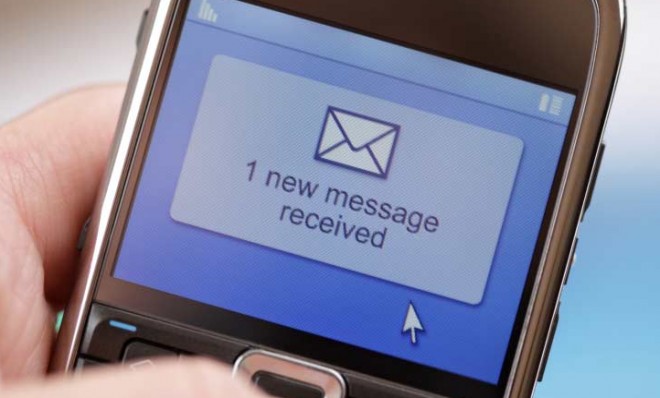The text message turns 20: A brief history of SMS
The first message, sent two decades ago, simply read "Merry Christmas"

A free daily email with the biggest news stories of the day – and the best features from TheWeek.com
You are now subscribed
Your newsletter sign-up was successful
HBD, text messaging! The first SMS text was sent 20 years ago today by Neil Papworth, then a 22-year-old communications engineer working in the United Kingdom. Papworth's SMS — Short Messaging Service — text was sent from a PC (phones didn't yet have keyboards) to a friend at a holiday party across town and read simply, "Merry Christmas." Here, a brief history of the humble beginnings and ensuing explosion of texting:
1984: An idea is born
Sitting at a typewriter at his home in Bonn, Germany, Friedhelm Hillebrand types random sentences and questions, counting every letter, number, and space. Almost every time, the messages amount to fewer than 160 characters — what would become the limit of early text messages — and thus the concept for the perfect-length, rapid-fire "short message" was born. "Perfectly sufficient," Hillebrand would recall later about his discovery, which came long before mobile phones were an everyday tool.
The Week
Escape your echo chamber. Get the facts behind the news, plus analysis from multiple perspectives.

Sign up for The Week's Free Newsletters
From our morning news briefing to a weekly Good News Newsletter, get the best of The Week delivered directly to your inbox.
From our morning news briefing to a weekly Good News Newsletter, get the best of The Week delivered directly to your inbox.
Dec. 3, 1992: The first text message
Papworth, a former developer at Sema Group Telecoms, sends the world's first SMS greeting to his friend Richard Jarvis, who at the time worked at U.K. service Vodafone. Jarvis couldn't say "Merry Christmas" back, because his brick-sized Orbitel 901 phone had no way of inputting text.
1993: Mobile phones get SMS
Finnish phone-maker Nokia debuts the first mobile phone that's able to send texts. Early text messages — which have to be painstakingly entered on numerical keypads — are free, but can only be sent between two people on the same network. This remains the standard for quite a few years.
A free daily email with the biggest news stories of the day – and the best features from TheWeek.com
1994: SMS as broadcast
Vodafone — one of only two mobile networks in the U.K. — launches a share-price alert system for business people.
1995: T9 debuts
The Tegic or "T9" system, which predicts texting based on what letters you're typing, first sees the light of day. Though confusing at first, the input method becomes popular among slick-fingered texters.
1997: Enter QWERTY
The Nokia 9000i Communicator becomes the first phone to come equipped with a keyboard. Future BlackBerry fans rejoice.
1999: Worlds collide
Text messages finally cross networks for the first time, and "a new fever" is born, says The Wall Street Journal. College kids begin latching onto the inexpensive, quick-fire technology as their communication medium du jour.
2000: Text messaging takes off
Now capable of texting with their friends on other networks, Americans begin sending (a now comically low) 35 texts per month.
2002: Text messaging really explodes
More than 250 billion SMS messages are sent worldwide.
July 2006: Enter Twitter
Twitter makes its debut as a text-message-based service in the summer of 2006. Its famous 140-character limit was set by SMS' own limitations pioneered by Hillebrand.
2007: Texting surpasses calling
NBD. The number of texts sent in a month passes the number of monthly phone calls placed by Americans for the first time ever.
2008: The texter-in-chief
Presidential candidate Barack Obama sends supporters a text message announcing Joe Biden as his vice-presidential running mate.
2010: The service peaks
The International Telecommunications Union reports that 200,000 text messages are sent every minute. 6.1 trillion texts are sent worldwide over the entire year.
June 2012: Evidence of a decline?
Although some 7.4 trillion SMS texts were sent in 2011, up 44 percent from the year before, texting in the U.K., Sweden, the U.S., and other countries begins to see a decline in 2012, according to several research firms. Some critics say that text messaging simply isn't evolving. Others point out that consumers still have to pay to use the service, and many are instead looking to free messaging options. "It comes down to cost," Chris Ziegler, a mobile phone expert and senior editor at The Verge, tells ABC News. There are more alternatives than ever with BBM, iMessage, WhatsApp, and more. A "savvy subscriber can dispense of their text messaging plan altogether."
Sources: The Los Angeles Times, The Guardian, Mashable, The Wall Street Journal, Nielsen
-
 Colbert, CBS spar over FCC and Talarico interview
Colbert, CBS spar over FCC and Talarico interviewSpeed Read The late night host said CBS pulled his interview with Democratic Texas state representative James Talarico over new FCC rules about political interviews
-
 The Week contest: AI bellyaching
The Week contest: AI bellyachingPuzzles and Quizzes
-
 Political cartoons for February 18
Political cartoons for February 18Cartoons Wednesday’s political cartoons include the DOW, human replacement, and more